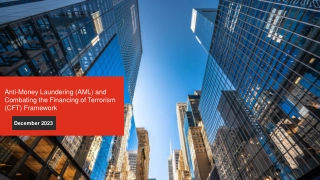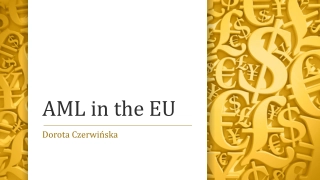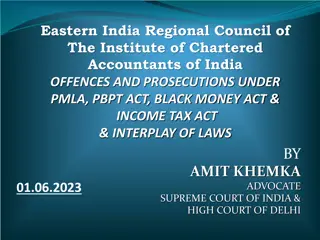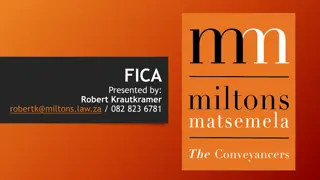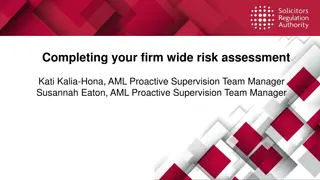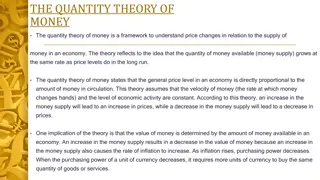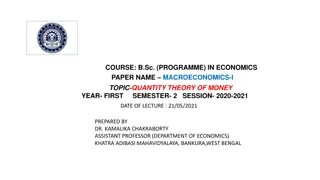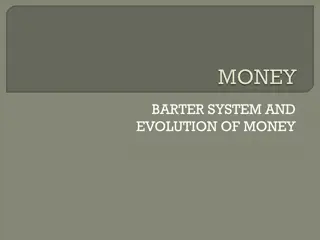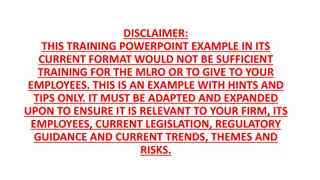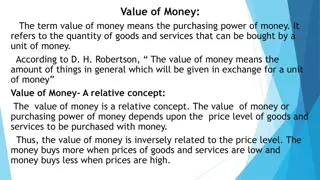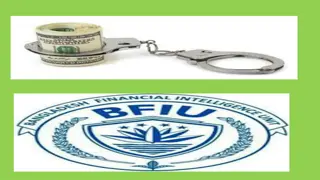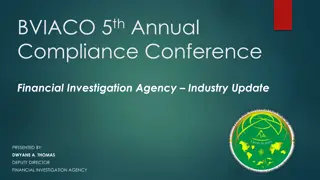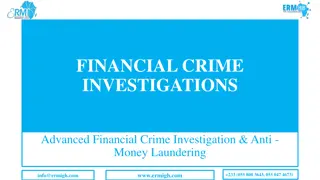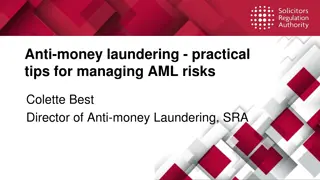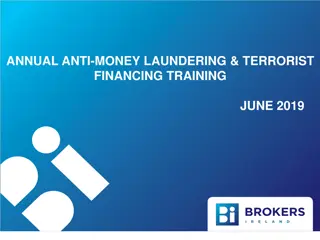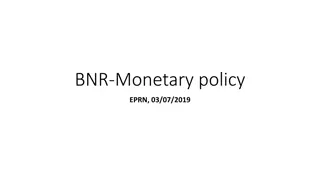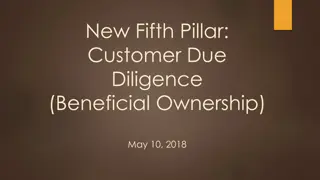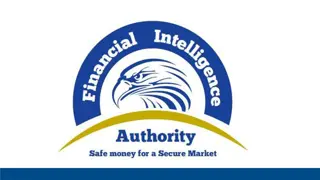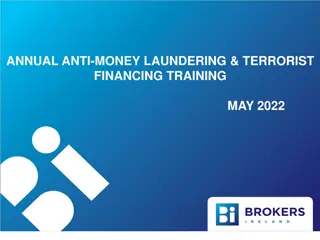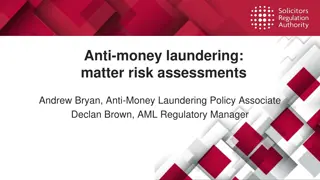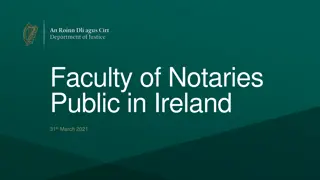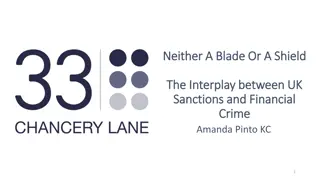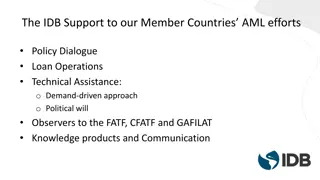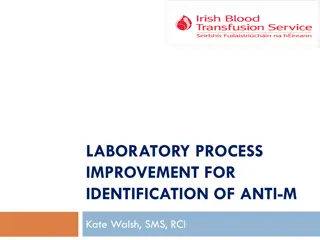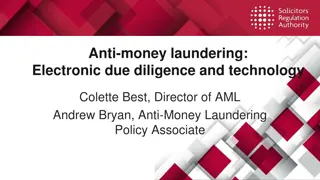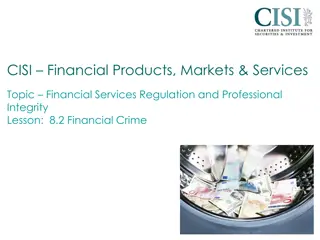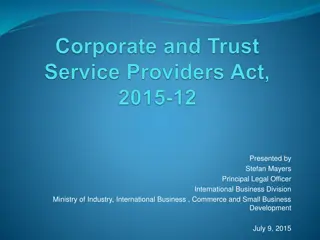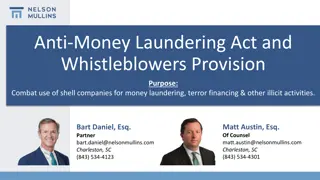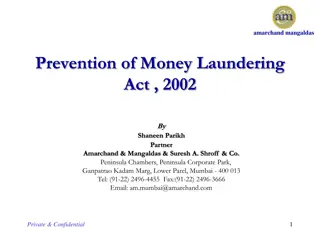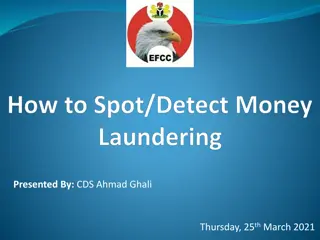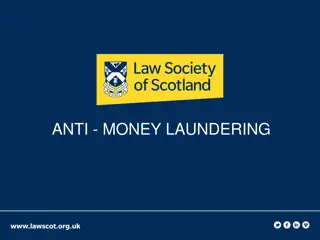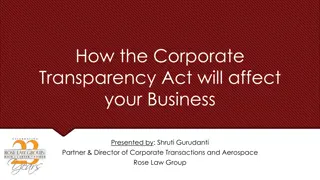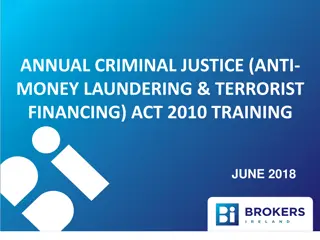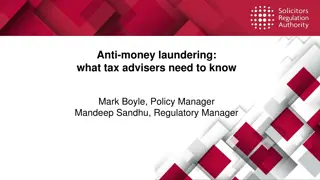Understanding Anti-Money Laundering (AML) and Combating Financing of Terrorism (CFT) Framework
Learn about the essential components of Anti-Money Laundering (AML) and Combating the Financing of Terrorism (CFT) framework, including regulatory obligations, objectives, money laundering processes, stages, sanctions, and regulatory overview. Discover how money laundering, terrorist financing, and
1 views • 30 slides
Evolution of Anti-Money Laundering Regulations in the EU
Explore the history and milestones of Anti-Money Laundering (AML) regulations in the EU, from the initial directives in 1991 to the latest amendments. Learn about the obligations on private entities, enforcement of AML laws, and the focus on gatekeepers in the financial system. The directives have e
1 views • 14 slides
Challenges and Future Prospects for Cypriot Banks
The presentation delves into the global challenges faced by Cypriot banks, including the economic impacts of the pandemic and the Russian invasion of Ukraine. It highlights advancements in anti-money laundering efforts, the adoption of ESG standards by Cypriot banks, and the importance of addressing
0 views • 34 slides
Overview of Money Laundering and Prosecutions under Indian Laws
Learn about the offence of money laundering under Indian laws, including definitions, explanations, and the interplay of various acts such as PMLA, PBPT Act, Black Money Act, and Income Tax Act. Get insights into the definition of proceeds of crime and the associated legal implications.
1 views • 83 slides
FICA Presented by: Robert Krautkramer
FICA, presented by Robert Krautkramer, aims to create transparency in financial transactions to combat money laundering and terrorism financing. The content explains the concepts of money laundering, the risk-based approach for accountable institutions, and the specific requirements for AIs to compl
2 views • 33 slides
Firm-Wide Risk Assessment for AML Compliance
This content discusses the completion of a firm-wide risk assessment for anti-money laundering (AML) compliance, covering requirements, risk factors, good and bad practices, template guidelines, customer risks, and controls in place to mitigate money laundering and terrorist financing risks. It emph
1 views • 22 slides
Understanding the Importance of Anti-Racism Charter in the Workplace
The Anti-Racism Charter emphasizes the difference between being non-racist and anti-racist, highlighting the need for action to address racial disparities in various aspects of work. It promotes creating a positive work environment, reducing discrimination, and fostering diversity and inclusion. Com
1 views • 9 slides
Understanding the Quantity Theory of Money
The quantity theory of money posits a direct relationship between the supply of money in an economy and price levels, assuming a constant velocity of money and economic activity. Increases in the money supply lead to price inflation, devaluing currency and decreasing purchasing power. Two main versi
2 views • 6 slides
UK Anti-Money Laundering Solutions Market
The UK Anti-Money Laundering Solutions Market Size is Anticipated to hold a Significant Share by 2033, growing at a CAGR of 7.12% from 2023 to 2033. \n\n
0 views • 4 slides
Understanding the Quantity Theory of Money: Fisher vs. Cambridge Perspectives
The Quantity Theory of Money explains the relationship between money supply and the general price level in an economy. Fisher's Equation of Exchange and the Cambridge Equation offer different perspectives on this theory, focusing on money supply vs. demand for money, different definitions of money,
0 views • 7 slides
Evolution of Money: From Barter to Electronic Banking
Money has evolved from the barter system to electronic banking through various stages like animal money, metallic money, paper money, and credit money. The invention of money was crucial to overcome the limitations of barter, leading to the ideal utilization of resources and solving issues like the
0 views • 14 slides
Anti-Money Laundering Training Overview
This training example provides insights and tips on Anti-Money Laundering (AML), covering topics such as understanding money laundering, risks in the accountancy sector, criminal perspectives, predicate crimes, and more. It emphasizes the importance of tailored and comprehensive training to combat f
0 views • 39 slides
Understanding the Value of Money and Standards
The value of money refers to its purchasing power, which is influenced by the price level of goods and services. Different standards, such as wholesale, retail, and labor, help measure the value of money. Money can have internal and external value, affecting domestic and foreign transactions. The Qu
0 views • 62 slides
Money Laundering Offences and Investigations in Bangladesh
Bangladesh's Financial Intelligence Unit can authorize investigation agencies to investigate predicate offences, but who will investigate money laundering offences? The Money Laundering Prevention Act, 2012 outlines penalties and forfeiture of property for such offenses. Entities such as banks, fina
0 views • 12 slides
Updates on Financial Investigation Agency: Legislative Amendments and Mutual Evaluation Readiness
Ongoing preparations for the upcoming Mutual Evaluation, introduction of AMLive STR e-Reporting Portal, legislative amendments, and additions impacting the Financial Investigation Agency. The FATF Mutual Evaluation scheduled for July 2022 assesses the Territory's anti-money laundering measures. Enti
1 views • 12 slides
Advanced Financial Crime Investigations and Anti-Money Laundering Overview
Explore the world of advanced financial crime investigations, anti-money laundering, and the importance of estimating financial reporting errors. Delve into the role of internal audit and investigations, understand the significance of changes in accounting estimates, and learn why estimation is vita
0 views • 63 slides
Practical Tips for Managing Anti-Money Laundering Risks
Learn practical tips for managing Anti-Money Laundering (AML) risks, including the importance of getting it right, AML supervision techniques, basics to adhere to, and scenarios to consider when dealing with client funds. Stay informed about regulations and conduct firm-wide risk assessments to comb
0 views • 17 slides
Understanding Anti-Money Laundering and Terrorist Financing
Exploring the Irish AML/CTF legislative framework, definitions of money laundering and terrorist financing, elements of guilt, stages of money laundering, and the role of Designated Persons in combating financial crimes.
0 views • 94 slides
Understanding Money and Monetary Policy in Economics
Money serves as a medium of exchange, store of value, and unit of account in an economy. It is vital for economic transactions and stability. The quantity of money is measured using concepts like liquidity and monetary aggregates. The demand for money is linked to the Quantity Theory of Money, which
2 views • 12 slides
Understanding the New Fifth Pillar of Customer Due Diligence
The Customer Due Diligence (CDD) Final Rule, effective from May 11, 2018, adds a crucial 5th pillar to Anti-Money Laundering (AML) Program requirements aimed at improving financial transparency and mitigating risks related to illicit transactions. The rule outlines key elements such as customer iden
4 views • 32 slides
Understanding Money Laundering: Detection, Prevention, and the Role of Financial Intelligence Authorities
Explore the practical aspects of detecting and preventing money laundering, with a focus on the role of the Financial Intelligence Authority in Uganda. Learn about the effects of money laundering, the obligations of accountable persons in anti-money laundering efforts, and the penalties associated w
4 views • 27 slides
Understanding Anti-Money Laundering & Terrorist Financing Training
Explore the essential aspects of anti-money laundering (AML) and terrorist financing, including the Irish legislative framework, definitions, and stages of money laundering. Learn about designated persons, key legislation, and the consequences of engaging in illegal financial activities.
7 views • 140 slides
Understanding AML Risk Assessments and Due Diligence Regulations
Anti-money laundering (AML) risk assessments and due diligence regulations are crucial for preventing money laundering and terrorist financing. This content discusses the importance of risk assessments, client due diligence, and regulatory compliance in the AML landscape. It emphasizes the need for
0 views • 13 slides
Understanding Significant Beneficial Owners (SBO) Declarations in India
SBO Declarations were introduced under the Companies Act, 2013 to enhance corporate transparency by uncovering ultimate beneficiaries with significant control over companies. These rules aim to prevent money laundering, combat financial crimes, and address tax evasion. Section 90 mandates individual
0 views • 38 slides
Overview of Anti-Money Laundering Obligations for Notaries in Ireland
The Faculty of Notaries Public in Ireland hosted a session on Anti-Money Laundering Compliance Unit (AMLCU), emphasizing obligations under the Criminal Justice Act. Established in 2010, AMLCU plays a vital role in combating money laundering and terrorist financing. The event highlighted risk assessm
0 views • 14 slides
UK Sanctions and Financial Crime: Interplay, Types, Enforcement, and Offences
The UK sanctions landscape post-Brexit, governed by the Sanctions and Anti-Money Laundering Act 2018, focuses on financial sanctions, human rights, anti-corruption measures, immigration, trade, and transport sanctions. The system allows for the issuance of licenses for specific activities under sanc
0 views • 13 slides
Supporting Member Countries' Anti-Money Laundering Efforts: IDB Initiatives
The Inter-American Development Bank (IDB) offers support to member countries in their anti-money laundering (AML) efforts through a demand-driven approach, policy dialogue, loan operations, and technical assistance. The focus is on strategic engagement areas, incremental approaches, and collaboratio
0 views • 4 slides
Laboratory Process Improvement for Identification of Anti-M by Kate Walsh
This presentation by Kate Walsh focuses on the laboratory process improvement for the identification of Anti-M, discussing the background of Anti-M, current management practices, proposed changes, and results. It delves into the M antigen, prevalence among different ethnicities, and the overview of
0 views • 30 slides
Modern Approaches to Anti-Money Laundering Technology
Explore the evolving landscape of anti-money laundering (AML) technology, focusing on electronic due diligence, regulatory frameworks, client perspectives, and technical advancements such as biometrics and cryptocurrency. Learn how the legal sector is embracing innovation and leveraging technology t
1 views • 13 slides
Understanding Money Laundering Regulations and Professional Integrity in Financial Services
Money laundering is the process of disguising criminal proceeds to make them appear legitimate. This illicit activity involves three stages - placement, layering, and integration. International cooperation is essential in combating money laundering, with organizations like the Financial Action Task
0 views • 9 slides
Enhanced Anti-Money Laundering and Corporate Regulation Framework
Ministry of Industry, International Business, Commerce, and Small Business Development has implemented new Anti-Money Laundering Guidelines and the Corporate and Trust Service Providers Act to strengthen regulatory frameworks. The guidelines address gaps identified in the previous evaluation and int
0 views • 16 slides
Combatting Money Laundering: Understanding the AMLA and BSA
The Anti-Money Laundering Act (AMLA) and Bank Secrecy Act (BSA) play crucial roles in preventing money laundering and illicit activities. The AMLA imposes liabilities on businesses and individuals, with low intent thresholds, while the BSA empowers the Treasury to enforce AML programs. Understanding
0 views • 32 slides
Understanding the Prevention of Money Laundering Act, 2002 in India
Exploring the provisions of the Prevention of Money Laundering Act, 2002 by Shaneen Parikh, a partner at Amarchand & Mangaldas. The act aims to prevent and control money laundering, provide for confiscation of assets linked to such activities, and establish various authorities and procedures to comb
0 views • 34 slides
Understanding Money Laundering: Implications and Stages
Money laundering, the illegal process of disguising illicit funds as legitimate, involves various types and stages such as structuring and integration. Legal implications in the UK and US include severe penalties for individuals and corporations. Recognizing these practices is crucial in combating f
0 views • 13 slides
FICA Awareness 2019: Understanding Money Laundering and Terrorist Financing Process
This module covers key areas related to money laundering and terrorist financing, including AML legislation in South Africa, obligations of accountable institutions, reporting requirements, and more. Explore the illegal processes of money laundering and terrorist financing, understanding placement,
0 views • 35 slides
Understanding Anti-Anti-Virus Techniques and Retroviruses
Explore the world of anti-anti-virus techniques including Retroviruses and Entry Point Obfuscation. Learn about the methods used by viruses to evade detection and damage anti-virus software. Discover how Retroviruses like Ganda virus operate stealthily to hinder anti-virus programs. Delve into strat
0 views • 24 slides
A Practical Guide for Anti-Money Laundering Policies & Procedures
This comprehensive guide provides essential information on developing effective policies and procedures for anti-money laundering (AML) compliance. Covering topics such as risk assessment, customer due diligence, reporting suspicious activities, and integrating AML controls into daily transactions,
0 views • 13 slides
Impact of Corporate Transparency Act on Businesses
The Corporate Transparency Act (CTA), part of the Anti-Money Laundering Act of 2020, aims to prevent money laundering and other illegal activities by disclosing beneficial owners of US entities. The act mandates reporting companies to provide ownership information to the US Treasury's FinCEN. Exempt
0 views • 37 slides
Understanding Anti-Money Laundering & Terrorist Financing
Anti-Money Laundering & Terrorist Financing are processes used by criminals to hide the origins and ownership of illegal proceeds. This includes not only drug trafficking but also tax evasion, financial fraud, and theft. To combat these activities, designated persons must follow specified procedures
0 views • 73 slides
Understanding Anti-Money Laundering Regulations for Tax Advisers
Tax advisers need to be aware of Anti-Money Laundering (AML) regulations to ensure compliance. The webinar content covers background information, thematic areas, and guidance for tax advisers, including identifying red flags and understanding the boundaries of their work. It discusses the impact of
0 views • 11 slides
